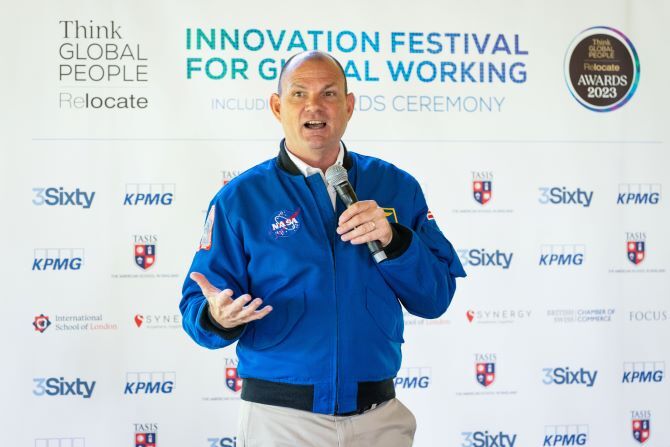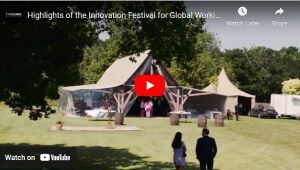NASA astronaut embraces ‘Think Global’ innovation message
Tony Antonelli shared his leadership insights - and the foundations of his extraordinary career - with guests at the Innovation Festival for Global Working in the bucolic surroundings of Relocate Global HQ in Kent.

Watch the video highlights from the Innovation Festival for Global Working
The former US Navy Commander has piloted two space missions as a NASA astronaut. Tony Antonelli is now playing a lead role shaping the future of space exploration. With his international team of colleagues at Lockheed Martin, Tony is developing the new Orion space vehicle, which will carry humans to the moon and on into deep space.Introducing Tony and the day’s programme at the Innovation Festival for Global Working, Relocate Global’s managing editor, Fiona Murchie, said: “I firmly believe now is the time to grasp the opportunity to push innovation to the absolute limits. Innovation is very important in our work as we face challenges like skills shortages, compliance and the five-generation workforce. This is all about making connections, learning about and developing your own practical solutions and motivations.”
Find out more from the Innovation Festival for Global Working
- Festival attendees endorse ‘think global’ innovation message
- Inspirational Innovation Festival for Global Working sets the agenda
- Innovations in international working
- Congratulations to 2023’s Think Global People and Relocate Awards winners
Think global people – seeing the bigger, human picture
NASA, national space agencies and commercial space-tech enterprises globally employ millions of people across the supply chain. Operating at the cutting edge of innovation, their spin-out benefits are already, and have the potential to be, life-changing. Together, they are also among the most talent-driven and multicultural agencies and organisations in the world.Leadership excellence – personal, social and business – is fundamental to this. It is why Relocate Global invited Tony Antonelli to share his personal story and illuminate opportunities with everyone in the international management, global mobility and education arena in the relaxed setting of the Innovation Festival for Global Working.The former Naval pilot and NASA astronaut now works at the frontiers of science, innovation and business. He explored with guests how ‘think global’ is the key to innovation. Tony’s experiences 200 miles above Earth on the International Space Station have given him a unique global overview.“That’s when it really dawns on you that you live on a planet,” he explained. “We are a big blue marble floating against the blackness of space. The reason I want to send humans to Mars is I want a human to stand outside on the surface, look up into the night sky and see all of us; to soak in what it feels like to be human in space seeing the other 8 billion people. I don’t think it will feel like seeing a little blue star, right? I think it will feel like ‘wow, I’m surprised we don’t treat each other more neighbourly’. I want Earth to be a better place. I want us all to think globally as citizens of this beautiful planet.”Removing limits to opportunities
Tony’s personal drive to push boundaries is itself an act of innovation – doing something new, learning, planning and balancing risk and reward – and started at an early age. “I wasn’t happy with the circumstances around me when I grew up,” said Tony. “My mom’s answer was always the same: you should go to university, get a better job, build a good future – you can do it differently.” Yet the trajectory from classroom to space was not as straightforward as the scale of his success might suggest. “Culturally, when we write our bios, we edit out all the lows,” he explained. “It’s easy, especially for students and for me as well, to imagine someone has done everything perfect and flown through tougher and tougher challenges. But it doesn’t happen like that.”Tony explained at middle school, he “had no interest in science whatsoever” and failed a science class. A few years later, it was a teacher genuinely excited about science who ignited Tony’s interest. “He had an energy around science that was contagious. It was like ‘wow – this is cool and fun’. But if you had asked my teacher or colleagues ‘who’s going to go to MIT?', or 'who’s going to fly for NASA in space?’ they wouldn’t have picked me. That’s an important lesson for us all.”Tony came up against more preconceptions about what was possible at pivotal moments in his early education – “a battle I will continue to fight” through involvement in initiatives like ISSET’s Mission Discovery. At Tony’s school, very few people went to university. Even fewer went out of state and fewer still to MIT. “I was told by my high school guidance counsellor not to apply because ‘people from our area didn’t go to MIT’,” said Tony. “There are adults who don’t know as much as they believe they do telling kids what they can’t do before they get a chance to try.”Yet Tony’s personal determination, resilience and the support of key people around him enabled Tony to learn, stay on track and achieve his goals. He achieved both bachelor's and Master's degrees, his Navy wings, graduated near the top of his class at test-pilot school and was twice selected to fly in space. His first message to everyone is to commit to “never telling anyone what their limits are and to think globally.”Reflecting on how he studied hard over the holidays to gain his Master's degree and the many extra hours he put in during Naval pilot training, Tony said, “I am willing to outwork everyone. It’s ok to start and not be good. I also like competition. I worry about at least some of the cultures I operate in that competition has negative connotations. I mean it positively. My version of competition is let’s help each other as much as we can and then we each do our individual best. When I lose, it’s about what am I going to do differently next time?”Watch the Festival video highlights
The lessons for business
These personal lessons around innovation and leadership translate easily to the international management, education and Think Global People context: particularly now as employers increasingly take on agendas like diversity, equity and inclusion. Personal attributes like resilience and a growth mindset are more valued by employers, while greater collaboration, innovation and competition are essential to driving environmental sustainability, corporate governance and greater social equity.So, how can leaders create innovation-friendly cultures and practices – especially in international teams? Tony highlighted the shared cultures in professions and sectors that transcend national boundaries, and keying into those and finding shared ways to communicate effectively.“Whatever industry you are in there is often a culture that goes with it wherever you are. For me, the very best team I’ve ever worked on was my very first Navy fleet squadron,” said Tony. “You never went more than a minute without someone giving you very direct feedback. We raised our level of performance dramatically.”Being able to rally people around a mission – a task-in-hand or goal – plan and risk-assess are also critical, as are having a growth mindset and the knowledge and insight across teams at multiple levels to adapt well.“At NASA, we regularly talk about risk management or risk leadership,” Tony explained. “We all make risk-reward trades every single day. The risk-reward trade applies to business. Do we invest in this? Will it get a return on investment against a certain timescale and what’s the cost of friendly capital; how I use my today for profits tomorrow? It’s the same thought process in the work you are doing. What are you doing now weighed against the things you could choose to do?”It also means choosing the hard challenges – being motivated around a goal to go further. “I want us to learn more and to use that knowledge to make the world a better place,” Tony concluded. “I want to inspire the next generation to not be afraid of tackling challenges. I like space, but if you suggested any number of other good causes, I’d be ready to rally behind those. By doing so we learn so many other things that will make the world a better place.“It’s this idea of doing the hard things; you are going to learn so much along the way that will have applications. Just this week, we’ve seen the tiniest bit of energy from a solar array sent in microwaves down to Earth. The electricity from it is not enough to power a kettle yet, but you’re not trying to innovate if you’re not doing something new.”Watch the video highlights from the Innovation Festival for Global Working
Read more from the Innovation Festival for Global Working in the upcoming Summer issue of Think Global People magazine and about this year's winners of Relocate and Think Global People Awards in the special supplement. Reserve your copy here.
Find out more about the Think Global People community.
Subscribe to Relocate Extra, our monthly newsletter, to get all the latest international assignments and global mobility news.Relocate’s new Global Mobility Toolkit provides free information, practical advice and support for HR, global mobility managers and global teams operating overseas.
©2024 Re:locate magazine, published by Profile Locations, Spray Hill, Hastings Road, Lamberhurst, Kent TN3 8JB. All rights reserved. This publication (or any part thereof) may not be reproduced in any form without the prior written permission of Profile Locations. Profile Locations accepts no liability for the accuracy of the contents or any opinions expressed herein.






























